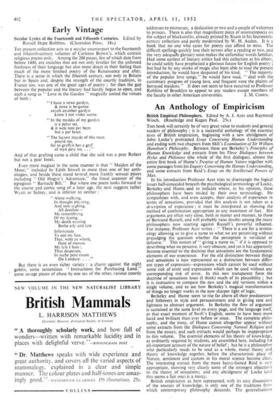Early Vintage
Secular Lyrics of the Fourteenth and Fifteenth Centuries. Edited by Rossell Hope Robbins. (Clarendon Press. 18s.)
THE present collection acts as a secular counterpart to the fourteenth and fifteenth-century volumes of Carleton Brown's, which contain religious poems only. Among the 200 pieces, few of which date from before 1400, are snatches that are not only lovelier for the unforced freshness of their language but also more direct in their feeling than much of the more finished poetry of the Renaissance and after. There is a sense in which the fifteenth century, not only in Britain but in Spain and, despite the strength of the courtly tradition, in France too, was one of the great ages of poetry ; for then the gap between the popular and the literary had hardly begun to open, and such a song as " Love in the Garden " magically united the virtues of both :
"I haue a newe gardyn, & newe is be-gunne swych an-other gardyn know I not vnder sunne.
"In the myddis of my gardyn is a peryr set, & it wele non per bern but a per lenet.
"The fayrest mayde of this toun preyid me, for to gryffyn her a gryf of myn pery tre. '
And of that grafting came a child that she said was a pear Robert but not a pear Ionet.
Even more magical in the same manner is that " Maiden of the Moor," included by Edith Sitwell in more than one of her anth- ologies, and beside these stand several more frankly sensual pieces including " Old Hogyn's Adventure," the lineal ancestor of the egregious " Barnacle Bill." But where one poem looks forward to the coarse and comic song of a later age, the next suggests rather Wyatt or Sidney, and is inferior to neither : "Alone walkyng, In thought pleyning, And sore syghing, All desolate— Me remembryng Of my lyuing, My death wyssing Bothg erly and late In fortunate Ys soo my fate, That, wote ye whate, Oute of mesure My lyfe I hate ; Thus desperate, In suche pore estate Do I endure. . . ."
But there is an even richer variety : a charm against the night goblin, some sententious " Instructions for Purchasing Land." some savage pieces of abuse by one sex of the other, various courtly
addresses to mistresses, a dedication or two and a couple of welcomes to princes. There is also that magnificent piece of onomatopoeia on the subject of blacksmiths, already printed by Sisam in his fourteenth. century collection and partly modernised by W. H. Auden. It is a book that no one who cares for poetry can afford to miss. The difficult spellings quickly lose their terrors after a reading or two, and the very adequdre glossary soon makes the unfamiliar words familiar. Had some earliest of literary critics had this collection at his elbow, he could safely have prophesied a glorious future for English poetry ; but had he by any stroke of magic also been able to read the present introduction, he would have despaired of his kind. "The majority of the popular love songs," he would have read, " deal with the customary progress of young love, and frequent were the plaints of betrayed maidens." It does not seem to have occurred to Professor Robbins of Brooklyn to appeal to any readers except members of'
the faculty in other American universities. J. M. COHEN.


































 Previous page
Previous page